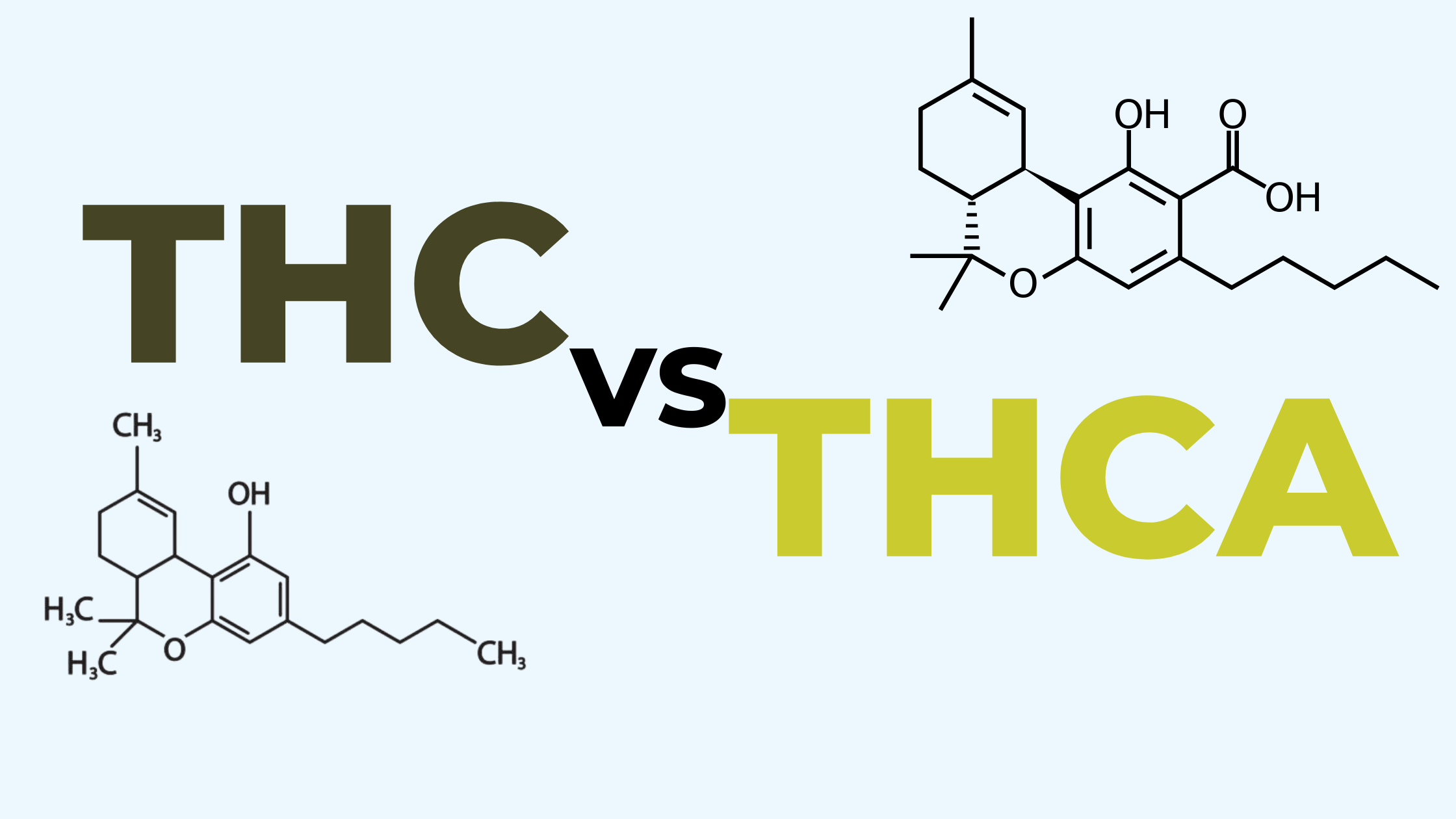
Unraveling THCA and THC Differences for the Cannabis Enthusiast
Introduction to THCA and THC Definitions and Origins
In recent years, the world of cannabis has become a topic of conversation not just among enthusiasts but also among health-conscious consumers and medical patients. For those residing in Florida, where medical marijuana is legal, understanding the components of cannabis is crucial. Two terms that often come up are THCA and THC, but what do they mean? This blog post will help clarify these definitions and origins. THCA, or tetrahydrocannabinolic acid, is a compound found in raw and living cannabis plants. THC, or delta-9-tetrahydrocannabinol, is a well-known psychoactive compound resulting from the decarboxylation (usually by heat) of THCA. Both play significant roles in the plant's chemical makeup, with THCA being primarily present in fresh cannabis leaves and flowers.
While THC is famous for the “high” it induces, THCA does not share this psychoactive property. This difference is due to the presence of a carboxyl ring in THCA, affecting its ability to bind to CB1 receptors in the brain responsible for euphoria. Cannabis enthusiasts and medical marijuana patients often seek to learn about these compounds to make informed decisions on their consumption methods. Understanding these elements' origins and roles can inform purchasing decisions and improve knowledge of cannabis benefits.
The Science Behind THCA and THC Molecular Structures and Effects on the Body
Unraveling the science behind THCA and THC involves examining their molecular structures and how they interact with our bodies. At the molecular level, THCA and THC differ due to a carboxyl group in THCA, which is removed to transform it into THC. This transformation mainly occurs when cannabis is heated, such as during smoking or vaporizing, a process known as decarboxylation. Once transformed into THC, the compound interacts with the body's endocannabinoid system, primarily binding with CB1 receptors in the brain. This interaction is what leads to the psychoactive effects or the “high” associated with cannabis use.
On the other hand, THCA, in its raw form, does not impact these receptors in the same way. It remains non-psychoactive and does not produce a high. Instead, THCA interacts with other receptors and pathways, offering different potential health benefits. Understanding these interactions provides insights into potential therapeutic applications and helps individuals choose consumption methods fitting their personal needs. Both compounds' science highlights the complexity of the cannabis plant and its myriad potential benefits and applications.
THCA vs. THC Key Differences and Similarities
When exploring THCA vs. THC, it's essential to understand both their differences and similarities. The most significant difference lies in their psychoactive properties; THC is psychoactive, while THCA is not. This distinction is due to their molecular makeup, where the absence of the carboxyl group in THC allows it to bind more effectively to CB1 receptors. Another key difference is in their natural occurrence within the cannabis plant. THCA is abundant in raw cannabis, while THC emerges primarily after heat-induced decarboxylation. However, the two share some similarities, such as their origins from the same precursor compound, CBGA (cannabigerolic acid), and their eventual presence as cannabinoids in cannabis products.
Both compounds also contribute to the plant's overall therapeutic profile, albeit in different ways. While THC is noted for its potential to aid with pain relief and appetite stimulation, THCA is being studied for its anti-inflammatory and neuroprotective properties. Recognizing these differences and similarities helps in selecting the right cannabis product for individual needs, whether seeking recreational enjoyment or medicinal relief. Knowledge of these compounds empowers consumers, especially in places like Florida, with a robust medical marijuana program, to make informed choices.
Health Benefits of THCA Anti-inflammatory Neuroprotective and More
THCA is gaining attention for its potential health benefits, which differ from those of its decarboxylated counterpart, THC. One of the primary advantages of THCA is its anti-inflammatory properties. It is believed to help reduce inflammation, making it a potential candidate for conditions such as arthritis and other inflammatory diseases. Additionally, THCA is being studied for its neuroprotective effects. Preliminary research suggests that it may help protect the brain from degenerative diseases, which could be beneficial for patients with conditions like Alzheimer's or Parkinson's.
Furthermore, THCA may also assist in managing nausea and vomiting, offering a gentler alternative for patients who cannot tolerate the psychoactive effects of THC. It's important to note that research is still ongoing, and while the benefits are promising, more studies are needed to fully understand THCA's therapeutic potential. For health-conscious Floridians and those using medical marijuana, integrating THCA into their regimen provides an opportunity to explore cannabis benefits without the high associated with THC.
Health Benefits of THC Pain Management Appetite Stimulation and More
THC is the compound most cannabis consumers are familiar with, particularly for its psychoactive effects. Beyond inducing a high, THC offers several noteworthy health benefits that have contributed to its popularity in medical marijuana circles. One of the most well-known benefits of THC is its effectiveness in pain management. By interacting with CB1 receptors in the brain, THC can help alleviate pain from various conditions, including chronic pain, neuropathy, and even cancer-related pain. Another significant benefit of THC is its ability to stimulate appetite, a property that has proven invaluable for patients dealing with anorexia or appetite loss due to illness or treatment.
Additionally, THC is known for its antiemetic properties, helping to reduce nausea and vomiting. This makes it a preferred option for patients undergoing chemotherapy. Besides these, THC also exhibits potential benefits in promoting sleep, reducing muscle spasms, and even enhancing mood, making it versatile in addressing multiple facets of health and wellness. Understanding these benefits is essential for patients and enthusiasts alike, particularly in a state like Florida, where medicinal use is legal and can be tailored to individual needs.
Legal and Medical Status of THCA and THC in Florida
Navigating the legal landscape of THCA and THC in Florida is crucial for both consumers and businesses. In Florida, medical marijuana is legal with a qualifying condition and proper medical recommendation. This legality extends to THC products, which are available through licensed dispensaries to registered patients. However, it's essential to recognize that while THC is regulated under medical marijuana laws, THCA is often treated differently. Since THCA is not psychoactive, it can sometimes be found in products outside the standard medical cannabis framework.
However, consumers should remain cautious and informed about any legislative changes that might impact availability and usage. For medical use, Florida's program provides a structured process for obtaining THC, ensuring that patients have access to the benefits it offers under a framework of safety and regulation. Understanding the legal status helps consumers make informed decisions about their cannabis use, ensuring compliance with state law and maximizing the benefits derived from THCA and THC.
How to Consume THCA and THC Recommendations and Best Practices
Choosing the right consumption method for THCA and THC can significantly affect your experience and the benefits you derive from cannabis. For THCA, consuming raw cannabis products like fresh leaves and juices is an effective way to incorporate it into your regimen. These methods preserve THCA in its non-psychoactive form, allowing users to enjoy its health benefits without the high. On the other hand, THC is typically activated through heat, making smoking, vaping, and cooking with cannabis popular methods for those seeking its psychoactive and therapeutic effects.
For health-focused consumers, tinctures and oils provide a controlled way to consume THC, offering precise dosages without the need to inhale smoke. It's essential to consider factors such as desired effects, onset time, and personal preferences when selecting a consumption method. For Floridians using cannabis for medical purposes, consulting with healthcare providers and experienced dispensary staff can provide valuable guidance tailored to individual needs and conditions. Responsible consumption ensures safety and maximizes the benefits of both THCA and THC.
Conclusion The Future of THCA and THC in Cannabis Products
The future of cannabis is promising, with THCA and THC playing pivotal roles in shaping its trajectory. As research continues to unveil more about their potential benefits, these compounds are poised to revolutionize how we perceive and use cannabis. For cannabis enthusiasts and medical patients alike, understanding the distinct properties and applications of THCA and THC allows for more informed choices, leading to enhanced experiences and outcomes. In Florida, where medical marijuana is a growing industry, staying informed about advancements and legal developments ensures consumers can access safe and beneficial products.
Looking ahead, innovation in cannabis product development is likely to introduce new ways to harness the power of these compounds, further expanding their therapeutic and recreational applications. By staying engaged and informed, consumers can continue to enjoy the evolving landscape of cannabis, supported by a foundation of knowledge and responsible use.
Encouraging Engagement and Sharing
We invite you to join us on this exciting cannabis journey. If you found this article helpful, share it with fellow cannabis enthusiasts and those curious about the benefits of THCA and THC. Your engagement helps foster a community of informed consumers and advocates for safe and responsible cannabis use. Additionally, if you have questions or insights to share, leave a comment below. We're here to support your exploration of cannabis and look forward to hearing your thoughts and experiences. Let's continue to build a future where cannabis is understood, appreciated, and utilized to its full potential.
Share




